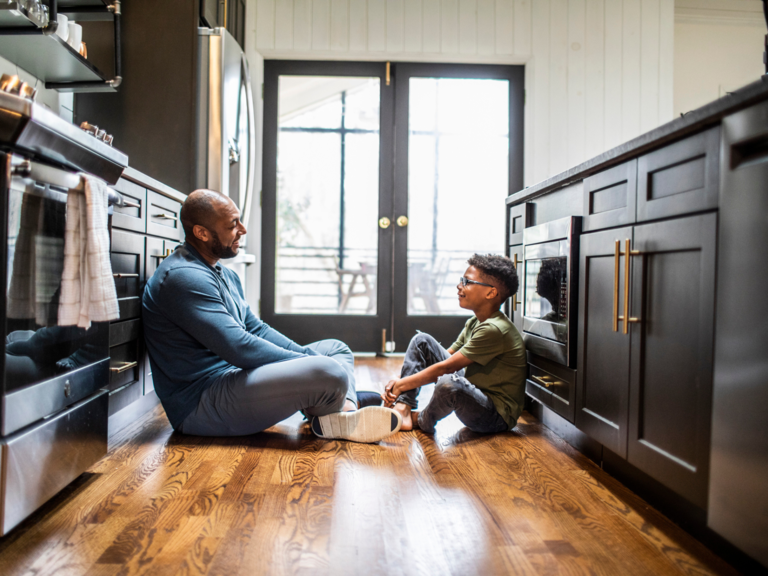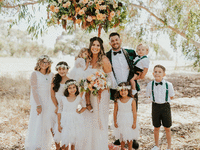How To Tell Your Child You're Getting Married With Love & Support

You've said yes to spending forever with your new future spouse and you can't wait to start planning the celebration, but, first, there's a bigger, just as important step to take: figuring out how to tell your child you're getting married with compassion, love and support.
This is a decision that will impact their life just as much as it does yours, and you want them to feel guided and cared for as you begin the next chapter in your life, one that includes a new family member and another person possibly serving in a parent role.
Therapist Gilza Fort-Martinez explains that it's critical to share this information in a loving and inclusive manner, one that helps ease the transition for the child. "It can help your children process their feelings about the changes in home and lifestyle that can come. I encourage a simple and straightforward style, then pause and give them space to think and process," says Fort-Martinez.
However, this can be stressful from the parent's perspective, and there are different challenges depending on how old the child is or what their relationship is with your current partner. Three therapists shared their perspectives on how to tell your child you're getting married, how to anticipate and prepare for their reaction, and how to set the stage for an open and supportive relationship with your child as you navigate marriage and new family dynamics.
In this article:
How To Tell Your Child You're Getting Married
"This is all about framing and preparing for the conversation," says Reena B. Patel, Parenting Expert, Positive Psychologist and Licensed Educational Board Certified Behavior Analyst. And that framing starts long before the big conversation—and even before there's been a big "yes!" Children should never be blindsided by a parent getting engaged to a partner, and here's how you can prepare children and then tell them that you are thrilled to be engaged to their future stepparent.
Introduce a long-term commitment before getting engaged.
Fort-Martinez says, "This a seed that can be planted long before the actual announcement." She recommends that, as dating progresses, the children are introduced to the new partner. The idea that this person may become a permanent addition to the family should be gradually introduced.
"Start slow and incorporate your partner into your children's activities. Check in regularly with all parties to see how they are feeling. All these factors may influence the circumstances of sharing information with your kids," explains Fort-Martinez.
Let your partner build a relationship with your children first.
Patel recommends letting the relationship between the partner and the children build. They should feel connected to your partner before the engagement even happens so that it comes as less of an adjustment.
"If your new spouse can ask their permission before the proposal this can alleviate some feelings of being left out and allow them to be part of the process," says Patel. She adds that this makes them feel like an integral part of big family changes. "Ultimately it can also bond your new blended family."
Consider the age of the child.
There are challenges with every age of children, from young children who may hope for a The Parent Trap situation to older children who are reluctant to accept a new parent figure into their lives.
Dr. Ulrick Vieux, Director of Child and Adolescent Psychiatry Education and Training at Hackensack University Medical Center, advises, "Provide age appropriate reading material. Be open to questions and make sure everything is appropriate for the child's level of understanding and maturity."
Be strategic with timing.
Timing is always key in life, and this is no exception. Patel says, "You want to make sure everyone is in a good mood, and you have enough time to fully talk it out." She explains that you shouldn't tell them in front of others or if you have plans following the conversation that could interfere with giving time to fully process in that moment.
She also says to avoid holidays, big events or telling children too late. "Don't wait until you have all the wedding details planned. They may feel out of the loop and that you planned it all without them and they could feel left behind or replaced," explains Patel.
Anticipate their questions.
Children will naturally have questions, particularly around how this major life decision will impact their day-to-day lives and traditions. Fort-Martinez says, " I recommend anticipating some of the children's questions: Are we moving? Are we having other kids? What do I have to call them? Try answering as lovingly and neutrally as possible."
Put yourself in their shoes and try to imagine how you'd feel. Come to the conversation prepared with answers to those top concerns and be compassionate.
Don't go in with expectations.
This is a big conversation that can create a lot of big feelings. It is important for you to take deep breaths too and let go of any expectations and hopes of a specific reaction," says Patel. There are situations where you can set yourself up for an ideal scenario. This is not one of them.
"It may be quick and easy if they have a good rapport with your partner. If the relationship has been strained, having a trusted family member, friend or even a professional may be helpful in explaining the changes," adds Fort-Martinez.
Be patient with their response.
"Embrace the new change and be supportive and patient as the children and new spouse adjust to being a blended family and in a new family dynamic," says Vieux. Let them take a break and go to their room to process.
Fort-Martinez adds, "Allow them time to grieve the realization that you and their other parent are not getting back together. This is generally a firmly held belief for many children, and remarriage can be heartbreaking for them. Loyalty ties are significant and may take time to redirect themselves." While this may not seem like something that was on the table from your perspective, approach it with love and respect for their feelings.
Involve them in the wedding planning process.
This can be a fun opportunity to bond! "Involve them in the wedding process. Offer suggestions without forcing them," says Fort-Martinez. You can feel out how interested they are in planning or whether there is something specific that piques their fancy. Maybe they'd love to add songs to a playlist or add a favorite dessert to the menu. Let them put a small stamp on your big day.
FAQs About Telling Your Child You're Getting Married
When should you tell your children you're getting married?
The first key is not telling them too late. The groundwork should be set for the child to anticipate that your partner could be a long term member of your family. Then, the official conversation should happen in a safe, controlled setting.
Fort-Martinez explains, "Choosing the right time and place to have this conversation with your child is essential. It should be done in a comfortable and private setting that is known to both of you so that the focus can be on easing the information." She recommends telling children before the engagement is announced to anyone else.
Should your future spouse be there?
Regardless of how solid the relationship is between the partner and children, children should be told directly by their parent, without the future spouse present.
Patel says, "I would recommend this be a conversation between you and your kids so they can share their emotions freely and openly. They might hold back if your current partner is present and feel like they cannot truly express themselves in the moment."
She explains that this gives them the space to focus on their own feelings, rather than worrying about what the future spouse might think or how that person will respond to their own reactions or questions.
How should you reassure children during the process?
Since children do best with predictability, safety and consistency, Fort-Martinez says that reassurance is key. No matter what their feelings are, you should remind them they are cared for and supported. "Reassuring them that you have their back and will keep them informed about changes can increase trust and enhance the relationship with your partner. Reassure that your commitment to them continues will be vital." Their biggest worry is being replaced and you have the power to let them know that will never happen.
If there are siblings, should you tell your children in a group or one on one?
Telling children one-by-one is usually recommended, rather than in a group. This lets them focus the attention on their own reaction, which may be different than the reaction of an older sibling. It reminds them that they are important and supported during an event that can be disruptive to their sense of consistency.
How should your ex-partner be briefed or prepared?
If you and your ex-partner or ex-spouse are on good terms, then it can be a good idea to tell them ahead of the children so they are aware when the children come to them with the news. Fort-Martinez says, "If it is amicable and you have a previous agreement about introducing new partners to the kids, this may already have been addressed."
However, she notes that if the relationship is hostile, the best thing may be to send a courtesy notification immediately after you've told the children, so the children are not expected to be the messengers. "It may be a text or email with a simple and direct message that you are getting married on X date and including any details that may involve the kids, such as their involvement in the ceremony or the need for childcare if you will be out of town," says Fort-Martinez.























